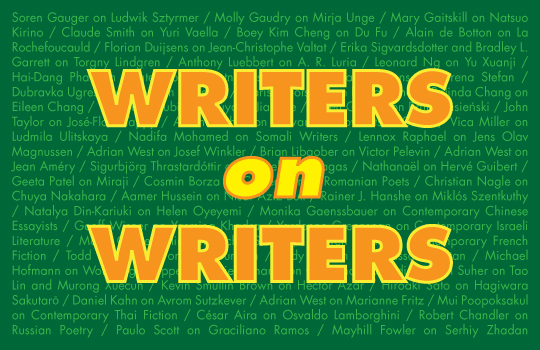It’s the first news roundup of the new year—and I’m still stuck in the last one: I very nearly typed “2015.” Lots of good things happened since we last caught up—not least of which that Asymptote happily reached its Indiegogo goal (“Indiegogoal?”)! This means you can look forward to our fifth-anniversary celebrations in fifteen events happening all across the globe between now and April. And don’t forget: we’ve extended the deadline for our translation contest—scramble your materials and get it together by February 1st for a chance at literary wealth, fame, and renown!
Posts filed under 'indiegogo'
Weekly News Roundup, 8 January 2016: Happy New Year!

This week's literary highlights from all across the world
Margaret Atwood Wants You to Support Our Year-End Fundraiser!

Only three days and exactly $1,220 left to go! Donate to our fundraiser today.
A MESSAGE FROM THE EDITOR-IN-CHIEF
This year was a big one for us at Asymptote! We won the 2015 London Book Fair Award for International Literary Translation Initiative and became the only member of The Guardian‘s Books Network dedicated to world literature. For the second year running, we made it to Entropy’s Best Magazines of the Year list, for doing “particularly exciting & generous things.” This was also the year we were mentioned in The New York Times, interviewed by Lianhe Zaobao, and praised in Der Tagesspeigel.
With your support, we were able to continue publishing our quarterly issues, as well as a monthly podcast, a daily blog, and our brand-new fortnightly airmails (with Daniel Hahn’s very popular column, “Ask a Translator”). Apart from releasing our first-ever educator’s guide, enabling teachers everywhere to use us as a classroom resource, we also kept our promise and organized a second edition of our international translation contest (still ongoing!). Judges Michael Hofmann, Ottilie Mulzet and Margaret Jull Costa will help us award $4,500 to six emerging translators.
Now, we’re raising funds to hold our most ambitious series of anniversary events around the world yet.

From January 2016 to April 2016, we are planning as many as 15 anniversary events around the globe, spread out over 5 continents. Confirmed participants include Ann Goldstein (translator of Ferrante), Forrest Gander (translator of Neruda), Natasha Wimmer (translator of Bolaño) and cult author Frederic Tuten in New York (Thursday, Mar 3, 2016), as well as acclaimed poet Caroline Bergvall in London (Wednesday, Mar 23, 2016). With our extensive experience (all previous 26 events documented here) we’re looking to curate a series of thoughtful readings and panel discussions in the name of promoting literary translation and world literature. All the money that we raise will go into organizing and publicizing these events, as well as marketing our fifth anniversary issue, so that even more readers can take advantage of our ever-expanding archive of world lit.
Junot Díaz, Yann Martel, Ingo Schulze and Sybille Lacan (daughter of the famous semiotician) have all contributed new and exclusive material to this milestone issue. And, for the first time in our pages, we will feature work from Uzbek, Mongolian, Guyanese and Sumerian, bringing our language tally up to 101—truly an achievement worth celebrating!
Reserve your tickets to our anniversary events with a donation now, if you’ve enjoyed what we’ve brought you this year. Support us so that we can bring our global conversation to a new city and give our fifth anniversary issue wings to reach more readers.
Furthermore the psychological boost that your donation represents (we’re all volunteers, remember) will help us carry on = PRICELESS.
Weekly News Roundup, 11 December 2015: Gift’s No Poison

This week's top literary links from all around the world
Happy Friday, Asymptote pals! Have you had a chance to check out Asymptote‘s year-end fundraiser yet? Our fifth(!) anniversary is just around the corner, and we’ve got fifteen events planned in cities all around the world to celebrate—but we need your help. Take a look at this year’s end-of-year Indiegogo, with all its tantalizing prizes (postcards! bookmarks! anniversary tickets—of the Asymptote sort), and remember the greatest gift is knowing you’re part of an organization doing seriously good work for world literature. READ MORE…
How Asymptote Can Teach You
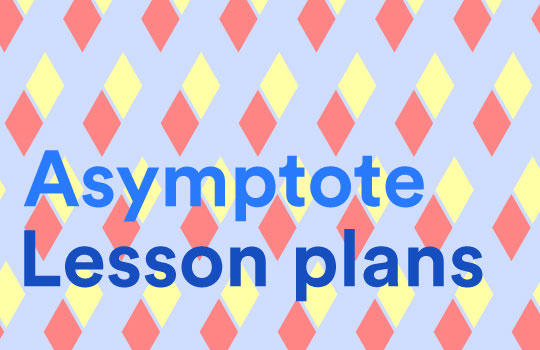
Teachers of literature, culture and writing: rejoice! Asymptote will soon offer free lesson plans
“If there were any journal that should have an educational branch, Asymptote would be it.”
So said a fellow poet, teacher, editor and friend, when I mentioned that we at Asymptote are launching an online bank of teaching plans and materials. For anyone to use, for free.
Why Asymptote? Because of its quality, depth, and range. As a truly global literary journal—we’ve featured work from 95 countries and 67 languages, at last count—that also publishes writing of many genres, Asymptote is already a veritable goldmine for teachers of literature. World literature (not to mention translation, creative writing, composition, cultural studies, and multimedia). Online, at no cost, students and teachers can read (and often listen) to both the original work and the translation, then explore links about the writer/translator(s) and their work.
Now, it’s even easier. Members of the Asymptote educational team (themselves teachers and professors) have compiled themed ‘units,’ complete with readings and assignments. Designed with both high school and post-secondary students in mind, these resources can easily be adapted to the needs of each classroom and instructor. Writing prompts, discussion questions, and small group activities are meant to stimulate discussion and debate by comparing and contrasting readings, questioning their place in global contexts, and recognizing the role of language and translation throughout.
One sad summer—possibly in 2010—I came across Vivian Gornick’s The Men in my Life. The book’s premise is simple. Gornick’s essays, written with characteristic clarity and poise, profile writers such as such as H.G. Wells, Loren Eiseley, and James Baldwin. From works and lives so very diverse, Gornick discerns one common thread: loathing, especially of the self, was often a potent inspiration. Loneliness, too.
The book’s title is less playful—and more literal—than one might think. Gornick’s men here are not just any men, nor just any literary men. They are, indeed, the men in her life. Each of her essays resounds as a conversation between two minds; the kind of conversation that doesn’t so much blur the distinction between life and letters as it nullifies the need for it. The book, for me, sparked a lasting fascination with essays by writers on writers—the very best of which open up the conversation to a third party, a sort of kindly voyeur: the reader.
And then a friend introduced me to Asymptote, an online journal with a whole section devoted to precisely that format. What better way to introduce writers little known in the Anglophone world than through the unique voice of another? However intimate the relationship between a writer and their mentor, colleague, rival, or translator, and however close or far apart they may be in age or geography—publishing these essays in English exposes these networks of admiration and craft, revealing tantalizing lines of further inquiry and further reading. READ MORE…
Why Asymptote Matters Today
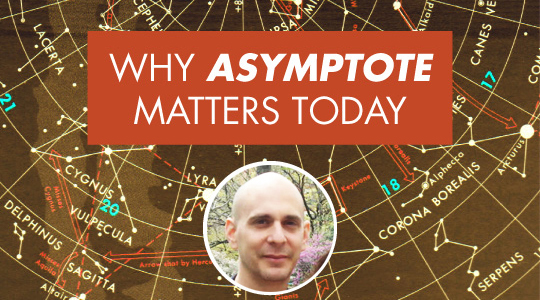
Every time a new journal or small press launches, it is a major event for literature; every time one closes, it is a disaster.
It is a rare person who will affirm that things in English-language publishing are exactly as they should be. The #readwomen 2014 campaign emphasized the scandalous gender bias in publishing, promotion, and reviewing; the translation database at Three Percent tracks abysmal figures for foreign fiction in translation; and anecdotally, anyone who has dealt with large publishers cannot help but lose heart at their willingness to lose millions on lavish advances for famous has-beens while refusing the relatively minor risk of publishing foreign writers of great stature.
The situation is hardly better with journals and magazines. While a cornucopia of poorly funded, university-based journals offers prospective writers and translators next-to-no visibility, more famous outlets, many of which state in their masthead a willingness to publish the new, the daring, and the uncategorizable, go on cranking out one mind-numbing workshop story after another. Then, up in the ether, are the Atlantic, the New Yorker, the Paris Review, and their ilk, at the gates of which the translator clamors like poor K. before the portal of Kafka’s castle. READ MORE…
Spotlight on Asymptote‘s Partner: Hong Kong’s Fleurs des Lettres
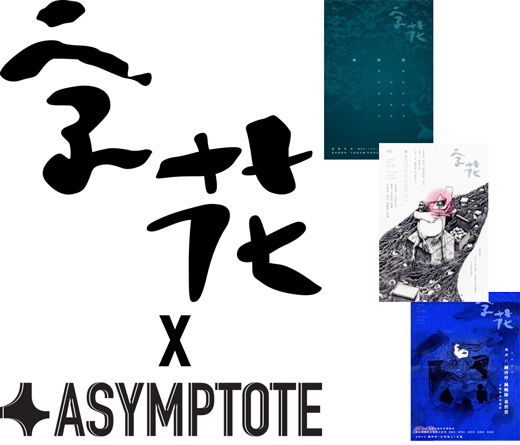
Testimonials from Asymptote's global literary partnership in Hong Kong, with journal "Fleurs des Lettres"
One thing that Asymptote certainly delivers is fresh literature. That is, we don’t just sit back and wait for submissions to ping! in our inbox, and make do with whatever we get. In fact, submissions—which we do take seriously, with five dedicated slushpile readers sifting through works that come in over the transom throughout the year—probably make up less than 20% of our published content, if we go by wordcount. Some sections, such as Drama, Interviews, Visual, Criticism, and Writers on Writers are heavily commissioned/solicited sections. These need very resourceful/persistent section editors, who can convert the most tenuous of leads into actual contributions. An entire blog post or probably even a book could be written about how we wooed author X or publisher Y or translator Z or guest artist A to come on board.
Even with very resourceful section editors, however, given our mission of diversity, no one editor can cover his or her section for too long and still do his or her job well. That’s where our supporting cast comes in: we have a jet-setting commissioning editor who is able to network on our behalf at writers’ festivals, we have contributing editors to pitch and contribute content, and as mentioned previously, we have an assistant editor researching hitherto unpublished languages, as well as editors-at-large with their fingers on the pulse of their regions’ literary scenes. Today we’ll talk about one facet of editorial work undertaken by editors-at-large that few of our readers may be privy to: journal partnerships.
It makes sense to partner with journals because as the first gatekeepers of literature everywhere, journals publish the freshest and most cutting-edge literature being produced in its region. As for how the partnership works: we take an article or a set of articles from a foreign language (i.e. non English-language) print journal and translate it into English to present in our quarterly issues. In return, the foreign language print journal then takes an article that we have published and commissions a translation of that article to be presented in its pages. All rights are cleared with the author of the article before proceeding. This is a model that stimulates the transmission of literature (in both languages) and benefits magazines, readers, authors, and translators alike.
A list of our journal partners to date can be found on our map here—two more slated for 2015 are Steaua in Romania and Writer in Thailand—but today we’ll only feature testimonials that shed light on one journal partner, the very stylish 《字花》from Hong Kong (also Fleurs des Lettres).
—Lee Yew Leong, Editor-in-Chief
From Ahtna to Zapotec: Celebrating Four Years of Literature from Rare and Underrepresented Languages

Assistant Editor Daniel Goulden on rare and underrepresented languages in translation and Asymptote
All too often, ‘World Literature’ gets reduced to European literature.
I jumped at the chance to help Asymptote buck that trend. When I came on board as assistant editor, Yew Leong (our editor-in-chief) asked me to research languages that Asymptote hadn’t yet featured in translation. This was—predictably—a challenging assignment.
For authors in the West, getting a novel published in translation is already an exceedingly difficult task. For authors elsewhere, the hurdles are exponentially greater. Regional instability and economic underdevelopment can stand in the way. Finding a talented translator—someone who not only speaks your language but also has the skill to make it come alive in English—or being found by one can be nearly impossible. Without passionate, skilled translators, many writers abroad who want their voices to be heard in other countries ultimately resort to writing in English (if they can) and thus set aside both their native language and its unique literary vocabulary. I found myself tracking down leads for hours, emailing contacts from around the world in search of an author or translator with work to submit. READ MORE…
Close Approximations Winners: Where Are They Now?
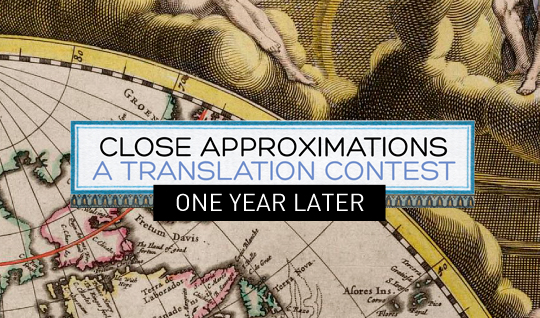
Our very first contest honored emerging translators. Now, a year later, our winners reflect on just what this contest means today
To witness the broad reach of Asymptote, one need look no further than Close Approximations, Asymptote’s first-ever international translation contest targeting fledgling translators and awarding $3,000 in prize money for two categories: poetry and fiction. (That’s $3,000 from your generous donations going directly into the pockets of these literary practitioners, but don’t forget that running a contest also requires heavy promotion—both paid and unpaid—, Asymptote‘s own editorial brainpower—in this case, to screen for the 20 best prose entries—, unseen but substantial administrative work—organizing contest entries and fielding queries from prospective contestants.)
Judged by no less than acclaimed translators Eliot Weinberger (in the poetry category) and Howard Goldblatt (in fiction), this contest received close to 200 submissions. Those who emerged victorious were lauded for their ability to “successfully cross the linguistic boundary,” and render translations that “zip along.” (Here are the complete judges’ citations.) Read on to see where these gifted newcomers find themselves now, a year after winning. If you would like to help us run a second contest (that will include a new nonfiction category!), give us some love—especially now that we’re entering the final stretch of our fundraising campaign, with TEN NERVE-WRACKING DAYS left!
—Lee Yew Leong, Editor-in-Chief
Worlds-Within-Worlds: A Testimonial

Indonesia Editor-at-Large Tiffany Tsao on Indonesian writing—and how Asymptote fits in a new, more nuanced "World Literature"
Asymptote’s mission is to introduce not only literary voices from a wide range of countries, but a greater number of voices from within each country. That’s where our twenty over editors-at-large, from Cuba to China, come in. Their goal? To seek out the worlds nestled within worlds that may be invisible from the outside. With their fingers on the pulse of their regions’ literary scenes, our editors-at-large act as extra eyes and ears for our section editors, ensuring a stream of the freshest content from the world over. Often this work is commissioned from scratch (see Mui Poopoksakul on Contemporary Thai Fiction or Yardenne Greenspan on Contemporary Israeli Literature). Editors-at-large also organize outreach events, partner with local journals, and send us literary dispatches for the blog. Our Indonesian editor-at-large, Tiffany Tsao, who gave us this dispatch from the 2014 Ubud Writers and Readers Festival, wrote the following blog post to commemorate our fourth birthday.
—Lee Yew Leong, Editor-in-Chief
World literature is a loaded word with a lot at stake. The term makes a grand promise: access to literatures, in foreign tongues, about unfamiliar peoples, in far-flung places. “World Literature” promises to reveal the astounding diversity of the globe through letters.
But its execution risks the exact opposite effect: in place of diversification, simplification; in place of multiplication, diminishment. A handful of writers behave as spokespeople for an entire nation, ethnic group, even continent; a single novel purports to function as representative of a variegated and ever-varying literary and popular culture of any given context. This prospect of oversimplification alarms both skeptics and advocates of world literature alike, and (unfortunately) even the most good-intentioned of attempts to avoid this plight may count for naught. READ MORE…
This is Asymptote: Say Ayotzinapa

A look back at Asymptote, Ayotzinapa, and solidarity through poetry & translation
Asymptote is the only literary magazine I’ve ever worked for (or even heard about) that has the editorial and translatorial brainpower and resources to pull off a 20-language project in 10 days.
Because that is just what we pulled off with Say Ayotztinapa, which—thanks to the intrepid blog, design, and social media teams—surged on the wave of worldwide solidarity with the victims of the Ayotzinapa massacre in September 2014 and with the subsequent protests. And it’s wasn’t only a translatorial feat, the post was shared in the thousands, including retweets by organizations like English PEN, Words Without Borders, and Granta.

Happy Birthday to Us!
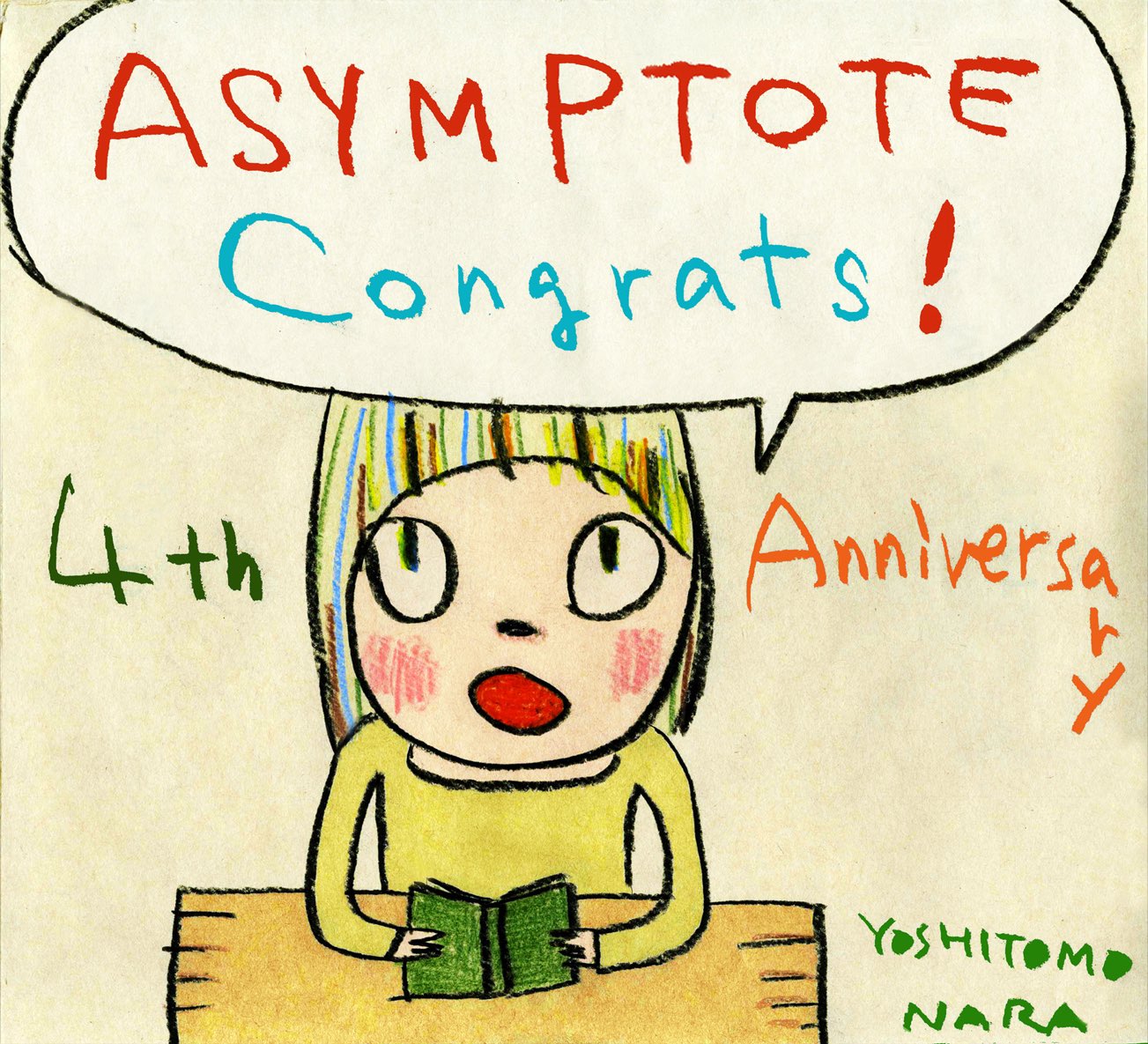
...Asymptote is a rather loquacious four-year-old. Let the festivities commence!
That’s right—your favorite online translation journal turns four this month and world-class writers, translators, and artists like Yoshitomo Nara, who especially made us the drawing above, will be helping us celebrate in a grand way! From now till January 29, we invite you to join us here on the blog as we showcase our proudest achievements and commemorate the most important projects in our four years of promoting world literature. Our brand-new Winter issue then goes live on January 30.
Naturally, you can celebrate our birthday virtually (ICYMI: one need only dig through our archives or explore our world map), but if you’ve got a hankering for a real-life Asymptote meetup, toast one of Entropy‘s 20 Best Journals of 2014 (the only world literature journal on the list!) alongside real-live Asymptote fans, contributors, and staff members at our New York event this Saturday, January 17. Tickets are $10 in advance and $12 at the door—it pays to think ahead.

And if you’re feeling generous, give the gift of literature to yourself and the rest of the globe by donating to our all-important Indiegogo campaign. As of this moment, we’ve already collected $9,158 from 116 donors (thank you!), which means we have $15,842 left to fundraise before our campaign ends on January 29. Our Chinese branch has also pitched in with a fundraising campaign of their own, collecting ¥7035 (or $1,137) from 114 donors so far. If we hit our goal of $25,000, we will be able to continue operating beyond January 2015 and keep bringing you the best world literature has to offer.

